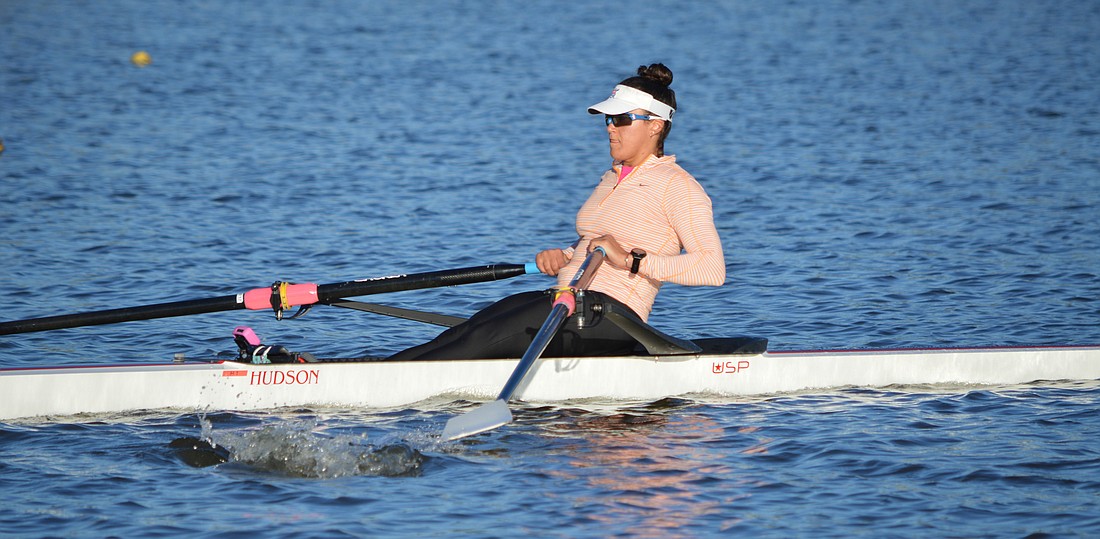- July 8, 2025
-
-
Loading

Loading

Stephen Rodriguez, the chief operating officer of Nathan Benderson Park, said the park’s financial situation could be much worse given the economic impact of the COVID-19 pandemic.
And now, with the return of U.S. Olympic Rowing Trials in February, the park has something to celebrate.
USRowing announced Jan. 22 that Nathan Benderson Park will host the first set of U.S. Olympic Team Trials for rowing Feb. 22-26. Trials to be held at Nathan Benderson Park include the women's single sculls, men's single sculls, men's double sculls, lightweight women's double sculls and lightweight men's double sculls.
"You have the (events) that are prestigious, they're great exposure for the park and for our community," Rodriguez said. "Olympic trials are exactly that. It's not a big event in terms of athlete numbers because it's limited to the best of the best. ... So you're not driving economic impact with that, but really, you're part of the Olympic movement."
In 2016, the Olympic Rowing Trials generated an estimated $862,000 for the region, along with 1,600 hotel rooms rented, but that was including fans. The event should be limited this time in terms of spectators.
"We anticipate that the economic impact for the event will be less than 2016," Rodriguez said. "However, the benefits of hosting the Olympic Trials is about marketing and exposure."
The Olympic Trials will provide a small economic boost to the area after a year in which Nathan Benderson Park didn't create its usual economic impact.
The park, which is managed by nonprofit Suncoast Aquatic Nature Center Associates, was created in part to drive economic impact to the area. Rodriguez said the park estimated its economic impact on the community was down $19 million for the fiscal year ending Sept. 30, 2020 based solely on events that were lost. That's a sizable chunk of the approximately $30 million per year the park had been averaging.
Rodriguez estimated the park lost about $250,000 worth of revenue from events that were canceled during the 2020 fiscal year, such as the USRowing Southeast Regionals, USRowing Youth Nationals and Sculling State Championships.
"We were able to get through some of the year that had some good, profitable events," Rodriguez said. "And then when we got events (canceled), we were able to keep our programming going. The programming really drove our income."
A couple programs have been constant sources of revenue during the pandemic. One is Rec Days, which was launched in early 2020 and has been held multiple times per month. Rodriguez said the park also saw a record number of children enrolled in its summer camps.
Additionally, the park has helped event holders who have suffered due to the economic impact of the pandemic.
“Their ability to pay full rates and so forth has been impacted,” Rodriguez said. “So we're balancing the continuing revenue for the park, but at the same time, trying to be a good partner to them, especially in the community.”
Rodriguez said the 2021 fiscal year could be worse than 2020 if the COVID-19 situation doesn’t improve by summer. For example, last year, many rowing teams had already paid to use the park for training before the COVID-19 pandemic sent Florida into lockdown. The park will likely dip into its reserve fund, which has more than $1.3 million, to offset the deficit, according to Rodriguez.
This year, about 90% of the teams that typically use the park for training in winter and early spring are canceling their visits, as almost everyone — barring Olympic hopefuls for the U.S. rowing team — is staying home. Rodriguez said team training typically brings in more than $100,000 per year.
Park officials said the pandemic has resulted in one silver lining. Nathan Benderson Park has become a more community-driven park. They said the park started seeing thousands of visitors on a daily basis during the pandemic and estimated the park hosted at least four times as many guests as usual on many days.
The park became a place where people who otherwise had little reason to step out of the house could enjoy a day of movement or leisure in the fresh air, according to Rodriguez. Some visitors even discovered the Finish Tower was an optimal place to do workouts in the shade.
Although these visitors don’t make the park any money, officials still saw value in the skyrocketing community usage.
“When we look at what our core missions are, one of them is about community,” Rodriguez said. “It's helping us fulfill our mission. So is it a financial benefit? No. Is it an economic impact benefit to have locals use the park? No. But it's a benefit to the community, and that's who we are.”